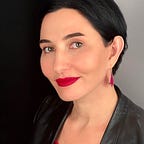A Year Into the Pandemic, I Miss Connecting With Strangers
We live in a time when getting too close to others might literally kill us, and that simple but horrific fact has changed everything. Our ability to connect has been compromised by forced distance from one another, and it’s taking a heavy toll.
Recently I was at a local café when, without warning, a woman bolted out of line and walked over to an isolated table. After a few very shaky deep breaths, tears began spilling out of her eyes. Normally I would have walked over to her and checked in. In the age of Covid-19, I was utterly paralyzed. How can I quietly and discreetly check in with a woman who is 6 feet away?
Finally, I decided to wing it. I left the line, and as softly as I could, from six feet away, said, “I have to ask. Are you OK?”
The woman looked up, almost startled by human contact. Then, through tears, she said, “I just left my mom. She’s in her 80s. I live in California and have to fly back home today to my daughter. My mom’s pretty careful, but I’m so scared she’s going to die, and I won’t be there — I won’t be there to hold her hand.”
I paused for a moment, not sure of what to say. Then, finally, “I’m so sorry. I’m so, so sorry. I wish I could help. This just really, really sucks.”“It does. It does suck. I hate it.” She paused, looked me straight in the eye, and said, “Thank you for asking. Really.”
We stood there quietly, just looking at each other, physically distanced, but unexpectedly emotionally close. It was beautiful, vulnerable, hopeful and profoundly uplifting. Despite our lack of physical proximity, our unexpected encounter was intensely honest and intimate.
Finally, she took a breath and said, “Thank you. This has meant a lot.”
Then she picked up her purse, and walked out the door.
Good Social Distancing and Bad Mental Health
Physical distancing during the pandemic has created painful emotional distancing.
I recently had a conversation with my friend Mike Ellis about the impact of social distancing. Mike is a therapist who has spent his career focusing on treating our most vulnerable.
